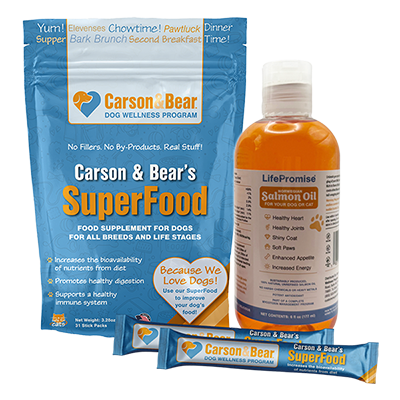As devoted guardians of our dog’s health, we do all we can — we even promise — to ensure they live long, happy lives. In return, we receive cherished companionship, wonderful walks and wagging tails of approval. Care choices, including what you feed your dog, make a big difference in how many years your furry family member is with you.
Here are eight in-depth steps to help you fulfill your heartfelt promise to your furry friend:
- Vet checks, comprehensive care: Consistent veterinary check-ups are foundational for maintaining your dog’s health. These visits should include thorough physical examinations, vaccinations, dental check-ups, and parasite control. Regular blood work is vital for detecting underlying health issues, assessing organ function, and monitoring response to treatments. Identifying any abnormalities early enables veterinarians to intervene and potentially prevent the progression of a serious illness, allowing dogs to live longer, healthier lives. Blood work can also reveal potential infections or inflammatory processes, enabling veterinarians to address these issues before they cause severe damage to the body. Additionally, blood tests can monitor the effectiveness of ongoing medications or treatments, ensuring that they are working effectively and can be adjusted as needed. Discuss with your vet the appropriate frequency for these visits based on your dog’s age and health status.
- Provide a nutritious diet: A diet that caters to your dog’s specific needs is crucial. This involves selecting high-quality proteins, healthy fats, and vitamins. Incorporate omega-3 fatty acids, found in fish oils and have anti-inflammatory properties. Consider your dog’s life stage, activity level, and any medical conditions when choosing a diet. Consult with your vet or a pet nutritionist to design a balanced diet plan. A diet rich in high-quality protein supports muscle mass, tissue repair, and enzyme production, all of which contribute to a dog’s overall strength and vitality. Essential fatty acids, such as omega-3, promote healthy skin and coat, reduce inflammation, and support joint health, crucial for maintaining mobility and preventing arthritis. Vitamins and minerals are essential micronutrients that play many roles in maintaining a dog’s health. Vitamin A supports vision and immune function, and vitamin B complex aids in energy metabolism. At the same time, calcium and phosphorus are crucial for bone health. You can optimize your canine companion’s chance of living longer by providing a balanced diet that meets their nutritional requirements.
- Maintain a healthy weight: Maintaining an optimal weight is essential to a dog’s longevity and to health issues like joint strain, heart disease, or diabetes. Excess weight can strain joints, lead to heart disease, and increase the risk of other health problems, such as diabetes and cancer. Here are some tips for maintaining your dog’s healthy weight, including feeding your dog a high-quality diet. Choose a food appropriate for their age, breed, and activity level. Control your dog’s calorie intake by monitoring the amount of food you are giving your dog and avoid giving them table scraps or too many treats. Also, regularly weighing your dog will help track their weight and adjust their diet or exercise routine. Talk with your veterinarian about a weight control plan if you are concerned about your dog’s weight.
- Offer regular exercise: Play and exercise are pivotal for your dog’s physical and mental health. Tailor the intensity and duration of exercise to your dog’s breed, age, and health. Include a mix of activities like walking, playing fetch, and swimming to keep them engaged and fit. Exercise also helps reduce stress and relieve boredom. Talk to your veterinarian to determine how much exercise is suitable for your dog.
- Keep vaccinations up to date: Stay on top of vaccinations to protect your dog against diseases. Follow a vaccination schedule as recommended by your vet. Vaccinations are an essential part of preventive care and can significantly extend a dog’s lifespan. Vaccinations expose a dog’s immune system to a weakened or inactive form of a virus or bacteria. Then, if they are exposed, their immune system has developed antibodies to fight the disease. The American Veterinary Medical Association (AVMA) recommends that puppies get vaccinated at 6-8 weeks old and continue getting booster shots throughout their lives.
- Provide dental care: Dental health is linked to your dog’s overall health. In addition to professional cleanings, establish a daily dental care routine at home. This may include brushing your dog’s teeth with canine-specific toothpaste and providing dental chews that help reduce plaque and tartar buildup. Such buildup can cause gum disease that can lead to bacteria entering the bloodstream. This creates the risk of infections in other parts of the body, such as the heart, kidneys, and liver. The American Veterinary Medical Association recommends that your dog have a dental cleaning at least once a year.
- Mind what matters: Mental stimulation is vital for your dog’s well-being. Engage your dog with interactive toys, training sessions, socialization opportunities, and new experiences. Mental stimulation prevents boredom and stress, improving overall health and behavior. Playtime with your canine companion can help prevent these problems and keep you and your dog happy and healthy. Try these: Teach new tricks, provide puzzle toys, go for walks in new places, and check out interactive toys.
- Keep an eye on your dog’s health: Be observant of any changes in your dog’s behavior, appetite, or physical condition. You know them like they know you and your habits. Early detection of issues such as lethargy, unusual discharge, or changes in eating habits is critical. Maintain regular communication with your vet regarding any concerns.



